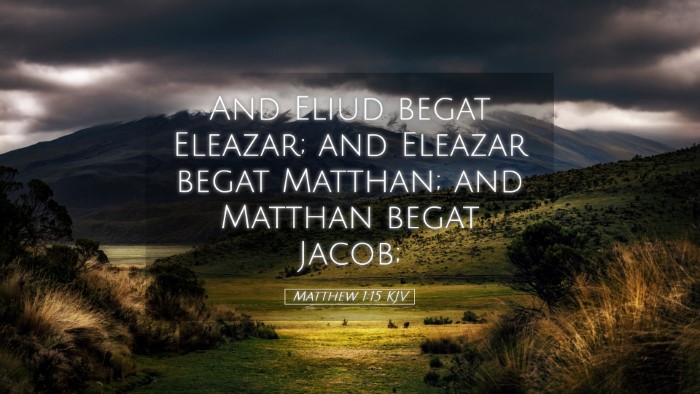Commentary on Matthew 1:15
Verse Reference: Matthew 1:15 - "And Eliud begat Eleazar; and Eleazar begat Matthan; and Matthan begat Jacob."
Contextual Overview
This verse is part of the genealogical record found in the opening chapter of the Gospel of Matthew, which serves to establish the lineage of Jesus Christ. Matthew's genealogy is structured to emphasize Jesus' royal lineage through David, satisfying Jewish expectations regarding the Messiah's descent.
Historical Significance
The genealogy presented in Matthew 1 serves several crucial functions. First, it roots Jesus firmly in the history of Israel, affirming His identity as a descendant of Abraham and David. This lineage is vital to the fulfillment of Old Testament prophecies concerning the Messiah. The names listed in this verse, though perhaps obscure to many readers, played significant roles in the continuum leading to Christ.
Insights from Commentaries
-
Matthew Henry:
In his commentary, Matthew Henry highlights the importance of this genealogy as not merely a list of names but as a testament to God's faithfulness throughout generations. Each name represents not only a lineage but also the unfolding of God’s plan of redemption. Henry particularly emphasizes that the names mentioned, including Eliud and Eleazar, remind believers of the divine orchestration behind their lives.
-
Albert Barnes:
Barnes notes that while the significance of names like Eleazar and Matthan may not resonate with the contemporary reader, their inclusion emphasizes the reality of Christ's human ancestry. He explains that these genealogical details reinforce the notion of Jesus’ genuine humanity and his rightful place in the Jewish heritage, effectively bridging the Old Testament with the New Testament realization of covenant promises.
-
Adam Clarke:
Adam Clarke provides a thorough analysis of each name in the lineage. He suggests that understanding and studying these names brings a deeper appreciation of the historical context. Clarke sees this portion of the genealogy also as an affirmation of God’s covenant faithfulness, signalling that despite human failings, God continues to preserve a remnant through whom He fulfills His promises.
Theological Implications
The lineage of Christ, highlighted in Matthew 1:15, has profound implications for Christian theology. It reminds believers of the continuity and faithfulness of God. The genealogical chart conveys assurance that God's purposes unfold within history and that He uses ordinary individuals to accomplish His divine will. This truth resonates deeply with pastors and scholars, demonstrating how every generation has a role in God's redemptive plan.
Practical Applications
For pastors, this passage serves as a reminder of God’s sovereignty in history and in the journeys of their congregants. Ministries today can find encouragement in the assurance that God meticulously orchestrates every detail of their lives for His glory.
For students and theologians, this verse underlines the significance of historic context in biblical studies. It's an invitation to delve deeper into the heritage of faith, exploring how God’s promises are embodied through generations.
Conclusion
Matthew 1:15, while a simple genealogical note, encapsulates the grandeur of God's redemptive story. It challenges readers to reflect on their place in the ongoing narrative of faith and to recognize that even in ordinary lives, God's extraordinary purpose prevails.


